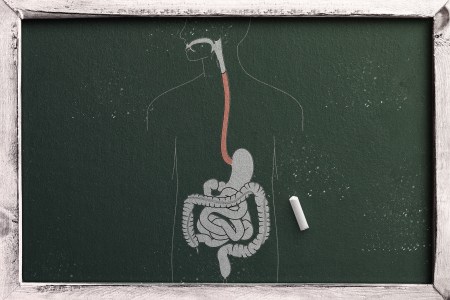Today in sleep optimization: the “10-3-2-1 sleep formula,” attributable to Dr. Peter Tierney, a performance coach who’s had stints with the England national football team and Leinster Rugby (the most successful club in Ireland), and currently works as a researcher at lululemon.
It’s a pretty simple method — each number refers to something you should try to limit before heading to bed. While we sometimes think of the wind-down routine as a sort of 30-minute fire drill directly before sleep, this formula prescribes four “rules” to be thinking about all throughout the day.
Here’s the method:
- 10 hours: cut off caffeine
- 3 hours: cut off eating
- 2 hours: cut off work
- 1 hour: cut off screens
More Reviews
If Your Mental Health’s Suffering, Try Cleaning Up Your Gut
The mind-microbiome connection is now indisputableLet’s say your bedtime is 11:00 pm. Under the 10-3-2-1 formula, you’d have your last cup of coffee around 1:00 pm; you’d aim to finish dinner by 8:00 pm; you’d close the laptop for good by 9:00 pm; and you wouldn’t check your phone, scroll through your iPad, or watch TV past 10:00 pm.
Right off the bat, one thing we really like about this formula is how reasonable/attainable it is. None of these suggestions require a heavy shift in lifestyle behavior. Most of us probably manage at least two of the four on a daily basis.
But getting into the habit of observing all four of these principles will take a boatload of stress off of your bedtime, by subtly attuning your sleep-wake cycle hormones. Last week we wrote about the importance of not consuming caffeine too early in the morning (and especially after a poor night’s sleep!) as you’re already spiking with cortisol the second you wake up. This advice puts a cap on consuming caffeine too late in the day, as the ingredient’s half-life isn’t too be trifled with, and it has a nasty habit of interfering with adenosine, a calming hormone that makes us feel nice and tired by day’s end.
It might seem silly to some, the idea of “preparing for bed” around lunchtime. But the decisions you make throughout the day impact how long you’ll be counting sheep at night.
Notice that the other 75% of this formula happens pretty close to bedtime. You’re most likely familiar with the perils of eating right before bed — it messes with your circadian rhythm, leads to weight gain (due to insulin resistance picking up at night) and can make it difficult to stay asleep, due to an upset stomach or indigestion.
Meanwhile, work and screentime, both of which involve melatonin-suppressing blue light, should be limited in that final two-hour window before sleep. This is what made the sleep formula particularly realistic to us, considering that A) the WFH era has pushed email-answering back later than ever, and B) most of us bring our phones to bed, whether we’d like to admit it or not.
Those last two habits might be the hardest to shake, even with the fact that Dr. Tierney has given the longest period of time throughout the day to engage in them. But hey, that just makes them something to closely evaluate and reconsider. Try shutting down work as early as possible (and that’s a firm shutdown — no “I’m just going to check one thing”) and seeing if you can trade your final 45 minutes of phone scrolling for a reading habit, instead.
Something that’s helped me a lot lately? The “night mode” feature on my Kindle. I’ll also make the backlight as warm and fuzzy as possible. So I’m basically reading golden letters against a black background. It simulates an experience I grew used to over the last decade (hopping into bed with the lights off, a screen emitting light two inches from my face), except the gentle light doesn’t hijack my brain chemistry, and the ritual lulls me off to sleep in that pleasant way that reading so often does.
Whether you’re looking to get into shape, or just get out of a funk, The Charge has got you covered. Sign up for our new wellness newsletter today.



















